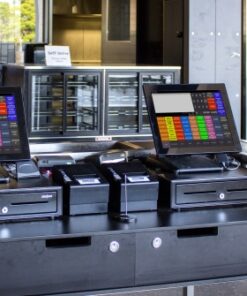A Point of Sale (POS) system is a critical component of modern businesses, revolutionizing the way transactions are processed and managed. From small retail shops to large chain stores, restaurants, and even online businesses, POS systems play a pivotal role in streamlining operations, enhancing customer experiences, and optimizing business performance.
At its core, a POS system consists of both hardware and software components, seamlessly integrated to facilitate transactions at the point of purchase. The hardware typically includes a computer terminal or touchscreen device, a cash drawer, barcode scanners, receipt printers, and often a card reader for processing various payment methods such as credit cards, debit cards, and mobile payments.
The software aspect of a POS system is equally crucial, providing the interface through which transactions are conducted, inventory is managed, and sales data is analyzed. Modern POS software solutions offer a wide array of features tailored to meet the specific needs of different industries and businesses. These features often include:
- Transaction Processing: At its core, a POS system is designed to process transactions quickly and accurately. Whether it’s scanning barcodes, manually entering product codes, or processing payments through various methods, the POS software ensures that transactions are completed seamlessly.
- Inventory Management: One of the key benefits of a POS system is its ability to manage inventory efficiently. By tracking stock levels, monitoring sales in real-time, and automatically updating inventory counts as items are sold, businesses can ensure optimal stock levels, minimize stockouts, and reduce excess inventory.
- Sales Reporting and Analytics: POS systems provide valuable insights into sales trends, customer behavior, and overall business performance. Through comprehensive reporting tools and analytics dashboards, businesses can track sales metrics, identify top-selling products, analyze customer preferences, and make data-driven decisions to drive growth.
- Customer Relationship Management (CRM): Many modern POS systems include CRM features that enable businesses to build and maintain relationships with their customers. By capturing customer information, tracking purchase history, and implementing loyalty programs, businesses can enhance customer satisfaction, increase repeat business, and drive customer loyalty.
- Integration with Other Systems: POS systems often integrate seamlessly with other business systems such as accounting software, e-commerce platforms, and marketing tools. This integration streamlines operations, eliminates manual data entry tasks, and ensures consistency across different business processes.
- Security and Compliance: Security is a top priority for any business handling sensitive customer data and processing payments. POS systems incorporate advanced security features such as encryption, tokenization, and EMV compliance to protect against data breaches and fraud, ensuring the safety and integrity of transactions.
- Flexibility and Scalability: Whether it’s a small startup or a large enterprise, POS systems are designed to be flexible and scalable to accommodate the unique needs and growth trajectories of different businesses. From adding new products and locations to expanding into new markets, a robust POS system can adapt and scale with the business.
In addition to these core features, POS systems often offer additional functionalities tailored to specific industries and business models. For example, in the restaurant industry, POS systems may include features for table management, menu customization, and kitchen communication, while in the retail sector, POS systems may offer advanced inventory tracking capabilities, support for multiple store locations, and omnichannel integration for seamless online and offline shopping experiences.
In summary, a POS system is much more than just a cash register—it’s a comprehensive business management solution that empowers businesses to streamline operations, enhance customer experiences, and drive growth. By leveraging the latest advancements in technology and innovation, POS systems continue to play a vital role in shaping the future of commerce.






